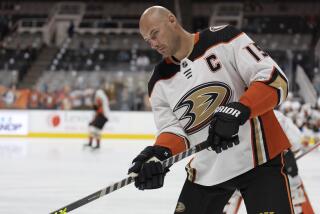Smart--and Smarter : In Only 14 Games, Capitals’ Jim Carey Has Become NHL’s Leading Goalie
They had traded their most experienced goaltender, and the top three goalies on their depth chart weren’t making the saves they needed to stay competitive.
But just when the Washington Capitals despaired of finding someone who could withstand the pressure--and convey his confidence to his teammates--they reached into their farm system and pulled out an Ace.
Jim Carey, nicknamed “Ace” in honor of actor Jim Carrey of “Ace Ventura, Pet Detective” and “The Mask” fame, has brought the Capitals back from the brink of playoff oblivion. Carey is 10-2-2 since he was promoted from Portland, Me., of the American Hockey League on March 1, and he leads the NHL with a 1.61 goals-against average.
His 93.3% save percentage in the 14 games puts him second to league leader Dominik Hasek of the Buffalo Sabres, last season’s Vezina Trophy winner, and he has helped the Capitals improve their save percentage from a league-low 88% to 90.3%. With Carey starting every game, the Capitals have surged into second place in the Atlantic Division and into an Eastern Conference playoff spot.
“It was more out of desperation than anything else that we made the change,” said General Manager David Poile, whose team was producing only two goals a game.
Poile had traded veteran Don Beaupre before the season and wasn’t satisfied with Rick Tabaracci, Olak Kolzig or Byron Dafoe.
“Goaltending hadn’t been our real problem, but it was like in baseball, when you need a pitcher to throw a no-hitter because you’re not scoring a lot of runs,” Poile said.
“He’s played terrific. He’s had a calming effect on our hockey club, and a number of individuals have picked up their play. Instead of getting one or two goals a game, we’re getting three now, which for us is a lot.”
Carey is making small leads seem insurmountable.
At 6 feet 2 and 190 pounds, he’s big enough to block much of the net simply by standing up. But he’s also shrewd enough to position himself well and can move quickly when he has to. He proved that at the University of Wisconsin, where his goals-against average was slightly more than three in each of his two seasons, and this season at Portland, where he started 13-0-3. He was 30-14-11 with a 2.76 goals-against average and six shutouts.
“It makes me sharper knowing we’re not going to score six goals, like Detroit,” said Carey, who was the Capitals’ second-round pick in the 1992 entry draft and signed a four-year, $1.6-million pro contract last fall. “It means you can’t be letting in a fluke goal or the goal that might lose the game. It keeps you mentally alert. . . .
“I really haven’t had to make that many adjustments. From a goalie’s standpoint, the increase in speed (from the minors to the NHL) doesn’t affect me as much as it would affect a defenseman or forward. Guys are a little quicker, sure. The thing I noticed is, players are a lot smarter. They see the ice incredibly and they tend to be more patient when they shoot, and that changes my game a lot. I just try to play an anticipation game and cut down the angles and use my size.”
Said Poile: “Well over half the shots hit him in the chest, so he doesn’t have to make split saves. His style is ideal for the NHL because he’s going to take the first shot. Sometimes that leaves a rebound, but that’s the responsibility of the defense. He’s not going to be beaten by the first shot.”
Carey, who grew up in Weymouth, Mass., patterned himself after Tom Barrasso, another Massachusetts native who was also considered tall for a goalie at 6-3.
“Just seeing him when I was a little kid gave me hope that I could make it,” Carey said. “He was an American kid, a local guy, and that gives you a goal.”
But Barrasso, after making the leap from high school to the NHL, was sent to the minors in his second season. And there were hundreds of goalies who made splashy debuts, only to fade into anonymity when shooters learned their quirks.
Poile is too smart and too cautious to predict that Carey will never have a slump. But he pointed to Carey’s training at Wisconsin--which also nurtured top-notch goalies Curtis Joseph of the St. Louis Blues and Mike Richter of the New York Rangers--and Carey’s calm temperament as reasons to believe the 20-year-old rookie will succeed.
“He believes he belongs,” Poile said. “It’s early, and you have to be cautious, but he seems to have a good grasp on things. It’s not a situation like a Ron Hextall (of the Philadelphia Flyers) where the guy is volatile. He’s just a very easy-going guy who doesn’t seem to be affected by all of this.”
He has recorded three shutouts and heard his name mentioned among rookie-of-the-year candidates, but Carey insists he hasn’t proved anything yet.
“Seven or eight games aren’t going to make a career,” he said. “Hopefully, I’ll spend 10 more years in the league and we’ll have the same conversation then.
“I might go 0-7. That’ll probably happen somewhere. With Portland, I went three weeks without a win after we started 13-0-3. You take the good with the bad. Right now it’s good, but I’m sure there’s going to be some bad.”
Carey’s other goal is to meet the other Jim Carrey, who grew up in Canada and, as a hockey fan, has attended several King games this season. Carey has “Ace” written on the back of his helmet, and four aces decorate the lower part of his face mask.
“He’s a great actor,” Carey said. “And it’s really a coincidence that at the same time he’s making it in movies, I’m in the NHL and I’m starting to make it. I just hope he makes more movies.”
If they play their cards right, both could be Aces for years.
More to Read
Go beyond the scoreboard
Get the latest on L.A.'s teams in the daily Sports Report newsletter.
You may occasionally receive promotional content from the Los Angeles Times.







